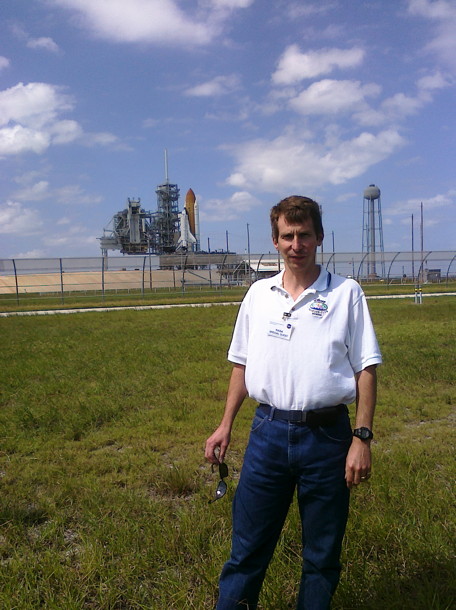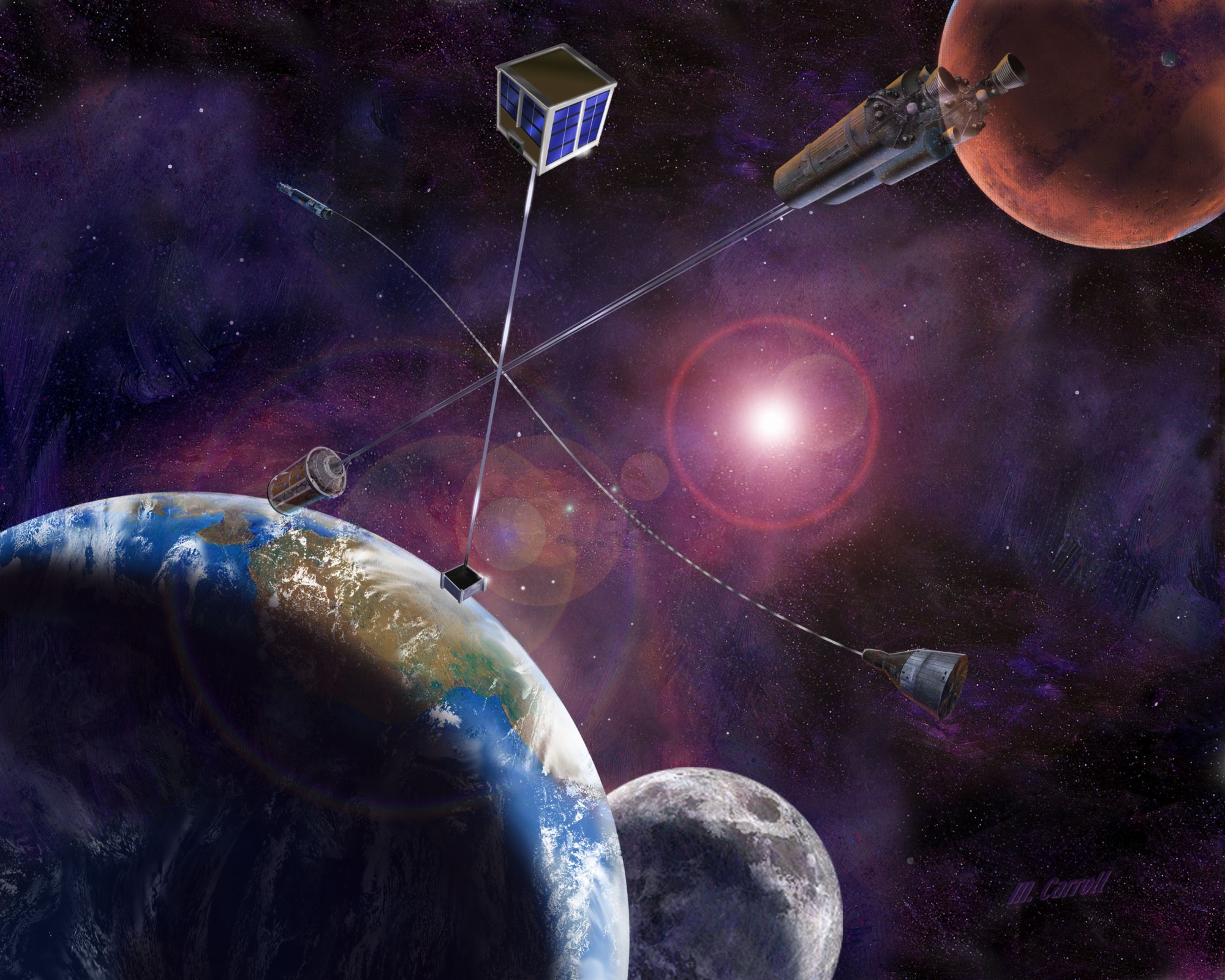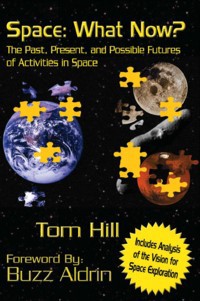|
|
 |
|
Here's the latest on space, and my opinions on it... This is the legacy site, with blog
entries from November, 2004 through June, 2011. Updates after June 9, 2011 can be found at http://spacewhatnow.com/SWN
|
 |
|
|
Friday, May 26, 2006
8 Criteria to Judge Investing in a Space Company
The Space Cynic has a blog entry about things you need to keep in mind before you invest in a new space startup. I like the list, and can think of many people
who've given talks at conferences who've violated at least one.
2:06 pm est
Space Nazis?
Jeff Bell has another opinion piece out. He takes a gaffe made by Peter Diamandis and builds upon it to put forth the notion that rabid space fans believe any
means are viable and reasonable to bring about their vision of a utopian space future. This piece brought me up a bit short,
because I've heard echoes of some of his thoughts in discussions I've had with the more fanatical members of the space club.
While none of them speak in the language he uses in the article, some of their passion could be manipulated by the right
person to achieve some ugly results, with or without their involvement.
I hadn't thought of some of the historical things he brings up in this particular light. In this piece, he discusses Werner
von Braun, not as a brilliant visionary seeing the future, but as someone who understood that other nations would see through
his arguments for the V2 (Bell's contention, which makes sense, is that ballistic missiles weren't practical until the advent
of small nuclear weapons) and stayed with Nazi Germany. While it fits the facts that Mr. Bell brings up, I've not heard this
version before.
Wednesday, May 24, 2006
Fly, GOES N!
Anyone who works in the aerospace industry has to tread a fine line when the comment on it. I generally downplay my job in
this blog, though to avoid charges of hiding information, my bio carries a fairly detailed story of my professional life. Today, however, is a time to talk about it.
I work on a satellite system called GOES which takes images like this. Today, the latest satellite in the series, GOES N, took to the skies to start what should be a long career monitoring the weather over the United States. I've worked on this
program for close to 7 years, and it's a relief to see it fly, even though the start of the mission means that now my work
is really cut out for me.
Spaceflightnow has the story and the pictures
As of right now, the spacecraft is still attached to the second stage as it drifts out to apogee. In about an hour, the second
stage will burn again and then cut the satellite loose. Then, assuming all goes well, it'll be time to get to business.
Saturday, May 20, 2006
Not Sure it's Worth Changing Nationalities
Japan is offering free rides on their H-2A rocket for secondary payloads. Unfortunately, you have to be a Japanese citizen or interest to participate
in the program. This has potential to generate some interest, since the highest (usually by far) cost of building a small
satellite is the launch cost, but if something similar happened in the US, some people might get upset.
Friday, May 19, 2006
Interesting Press Release Title
Here's a press release that I'd describe as "casting a wide net." The title is "NASA Wants Your Innovative Ideas."
1:27 pm est
NASA Getting Serious About Planetary Defense?
Well, it's a step in the right direction. There's a call for papers on the street for actions. There will be an eventual conference.
Wednesday, May 17, 2006
Mixed Feelings
I've been checking The Space Channel occasionally, seeing if any audition videos for Space Champions have been posted. Today, I got some news: - The good: My videos have been accepted and posted
- The bad: As of today, my videos are alone.
So, either my video is the best they got, or the only one they
got.
Top 10 Disasters
The Livescience crew has compiled a list of the top 10 threats to the United States. Asteroid impacts play a part in a few of them. I like the number 1 entry "destruction of the Earth"
Tuesday, May 16, 2006
Relyin' on a Helpin' arm
More details are coming out about NASA's selection of winners in the space station cargo/crew delivery effort. The picture in the article
led me to SpaceHab's site, where they have a movie showing their craft in operation. They share an approach with SpaceX in that they move to close proximity with the space station and then the station's arm grabs them and docks them to the necessary
hatch. That's all fine and good in a "don't-you-dare-bump-into-our-one-of-a-kind-asset" kind of mindset, but assuming others
take the same approach, they're all reliant on the arm working. No arm, no dock. My thoughts are that there's a backup plan
where the craft actually dock with the station on their own, but no one will talk about that much until it's necessary.
Thursday, May 11, 2006
Just a Little Reminder
Every now and then, we're reminded what a small part the space industry is of the US economy. Here's an article describing the video gaming industry as having an $18B annual impact on the US economy. That's more than the
NASA budget each year.
Tuesday, May 9, 2006
Dave Brody: Shuttle Should Resign
In researching another story, I came across this (not a permalink, but his last post was at the end of March, so you should have plenty of time. The Bad Astronomer spotted this post, too.)in the LiveScience blogs. In it, author Dave Brody says the shuttle should repair Hubble then retire
on a high note. He cites 5 myths about the shuttle/station, summarized here: - Flying the shuttle benefits science
- Building
the space station keeps Russian nuclear scientists from making trouble
- Hubble can be repaired with robots
- Station benefits
science (I really like his analogy of PhDs riding bicycles then peeing in cups)
- Shuttle is essential to finishing station
(here, he stretches a bit, in my opinion)
Read the whole thing. The comments to the Bad Astronomer post have some good info, too.
Monday, May 8, 2006
Methane not dead...
...at least not for sometime in the future. A new contract has been let for "risk reduction" in building future methane engines. I like the disclaimers at the end of the article.
For the record, I'd much rather have methane engines sooner rather than later, but understand that the budget is pushing them
into the "later" category. I think some creative thinking might accelerate the process, though, and this contract is not
what I'd consider to be creative thinking.
Now Here's a Show with some Potential
Channel Canada in cooperation with The Discovery Channel just started filiming a multi-media Mars experience for release in 2007. At least three parts are mentioned in the press release including a 3-hour miniseries called "Race to Mars" about the mission which has a 1-hour documentary about the crew after
their mission. There's also a 6-part documentary about how a Mars mission would actually take place, and an immersive software
package dealing with Mars as well. Looks like it could be impressive. My first thought is that the miniseries needs to be
more than 3 hours to do a Mars mission justice.
7:00 pm est
Sunday, May 7, 2006
New Title for Asteroid Threat: "Katrina from Space"
Looks like the NEO threat organization has coined a new term for asteroid threats, including comparisons for government inaction then (Katrina) and
potentially in the future (after an asteroid strike). The article is here.
This sort of thing is probably a good idea, as long as its not overplayed.
Upcoming X-Prize to Mars?
According to Sam Dinkin, Peter Diamandis hinted strongly at a major upcoming announcement. In fact, with the amount of information he gave out,
I'd call this the announcement. Calling it the "Mars Citizenship Program," He's looking for different tiers of investors
to put together a multi-billion dollar portfolio that will expand over 10 years to provide enough money to send people to
Mars. Whoa.
Friday, May 5, 2006
Burt Rutan Makin' more Friends at NASA
Burt Rutan gave a speech at ISDC, and there's a news report here. In it, he calls NASA's efforts to return to the moon "archeology" and expresses his own desire to go to the moon in his
lifetime. It's a long road from where we are now to Burt Rutan standing on the moon, though I won't go on record saying it's
impossible.
I agree with most of what Burt Rutan is saying, and I absolutely hope that his efforts revolutionize space travel as we know
it. I'm not sure if he understands the venom that his speeches inspire in some NASA employees. I met one of them at a conference
last year, and this person was most displeased with Burt Rutan and his "cavalier" attitude. In all fairness, this NASA employee
struck me as a rather pompus know-it-all, talking much longer than the time alloted for their presentation and monopolizing
major speakers' time after their talks.
I believe that this person's NASA mentality comes from the agency's (and most other government/scientific agency's) way of
doing business. Considering NASA's budget to be relatively fixed (yes, there have been increases recently), in order to "win"
funding for your project, you must convince your higher-ups that it's better than other researchers' projects. The definition
of "better" is hard to nail down, although it usually has to deal with how applicable the research is to future projects and
in the political sphere, how well you get along with your higher-ups.
So now, you've got Burt Rutan, who built a suborbital space program for the amount of money you're requesting for a follow-up
study to some obscure new technology that may or may not fly. I could see how this could inspire some jealousy. Of course,
jealousy is famous for focusing emotion on the wrong target, and few people professionally raised within a bureaucracy like
NASA would be able to see the fundamental reasons for why things cost so much. In case you need a refresher, they cost so
much not because they're hard (being hard does make things more expensive, but it does not have to make things unreasonably
expensive), but because the space/military infrastructure is built to turn small projects into big ones.
So what's the big deal if Burt Rutan upsets a few NASA bureacrats? Not much, as long as he can continue to function as an
autonomous agency. Sounds simple, but, as he mentions in the article, he's concerned about FAA certification of his new generations
of spacecraft. FAA is undergoing a major change to adapt to this new personal spaceflight paradigm. In most government agencies,
change like that means new people. Where would FAA hire people with space experience...NASA? Would a current NASA worker,
upset due to the loss of their program due to (as they see it) channeling $500M into the Commercial Orbital Transportation
Services ( COTS) effort, jump from NASA to FAA with an alterior motive? Surely not.
Good luck, Burt.
I need to take a moment to point out that I can't think of one civil servant that would consider such an action. However,
it would only take one.
Wednesday, May 3, 2006
Not sure I buy it
Interesting piece in Space.com today, referring to the need to beef up solar predictions and warning with the upcoming personal spaceflight
revolution. Essentially, the article says that the new system will allow operators to provide a more informed consent for
their customers. The usual proviso is attached of "more data is needed." Examples are given of airline pilots, who over
their careers receive a much larger dose of radiation than the average person because of their time spent high in the atmosphere.
I think this is something to not take lightly, but it's definitely not something to slow up progress. First, suborbital flights
are going to last on the order of minutes, not the hours of high altitudes that people spend on a jet aircraft (I know, the
jet doesn't go as high, but when you're talking about exposure times tens of times longer, and remember that flights over
the poles take a higher dosage) so radiation exposure for passengers in their 5 minute jaunt above the atmosphere is a point
of curiousity and not much else.
Orbital flights are obviously more serious, but radition is pretty low on the concern levels. There's a large database of
people who spent on the order of a week in orbit, and those who've spent much more have not taken many countermeasures against
radition.
When people start traveling to the moon, outside the protective space of our magnetic field, radiation will be more of a concern,
but by that point there should be some sort of "panic room" for the entire crew, not just the paying customers.
A Perfect Setup
This article (for the meek at work, here's a more work-friendly edition...I find The Onion's ads get a bit racy for mixed company) had a pretty large group of us laughing
around the office today. My favorite exchange about it was with someone who hadn't read it yet: Me: Have
you heard NASA is sending $700M into space?
Unsuspecting Coworker: In what form?
Me: 50s and 100s.
(Ususpecting coworker laughs heartily) They don't take it easy on the emerging private space industry, either: Some
in the private sector are attempting their own currency-expelling spaceflights, including Virgin CEO Richard Branson, whose
Virgin Galactic plans to eject £2 million from the still-theoretical SpaceShipThree orbital aircraft. I guess
one of the biggest problems is that, for a large segment of the population, NASA may as well be launching money into space.
7:51 pm est
Tuesday, May 2, 2006
Progressing in Rank
It's odd to see people who were the first people you met in the Air Force be selected as candidates for squadron command.
Air Force Space Command just listed their selectees in the Vigilant Eagle board process, which is a step in the process for
squadron command selection, and I want to take a moment to congratulate the following Air Force officers, who I worked with
over my active duty years (and some reserve) who are now elligible to lead: Lt Col(S) Ed ACKERMAN
Lt Col Mark ALLEN
Lt Col(S) Keith BALTS
Lt Col Kent DALTON
Lt Col(S) Tyler EVANS
Lt Col(S) Pat MCCUTCHON
Lt Col(S) Jen MOORE
Lt Col(S) Kevin O'ROURKE
Lt Col Al REBHOLZ
Lt Col(S) Steve STAATS
Lt Col Rory WELCH
Lt Col Jeff WOHLFORD Anyone who falls under the command of these folks should shoot me an email. I have
some pretty good dirt on many of them from their, I'll say "less nuanced" early days in uniform. I don't often get nostalgic
about the Air Force, but when I see friends moving up in the world, I'm curious where I'd be if I were still there.
|
|
|
 |
|
|
|
 |
|
Space: Search Now! with Google
| Tom and Discovery |

|
| Taken During a Tour of KSC on 6 Oct 2010 |
| TEMPO≥ Update |

|
| Click on the picture to go to the Mars Society TEMPO≥ Page |
| Solar System Ambassadors |

|
| Click on the image above to see Tom's SSA profile |
Email Comments to tom [at]
spacewhatnow.com
| Latest book! Click on the cover to purchase |

|
| I Want to go to Mars is a picture book for beginning readers |
More information on I Want to go to Mars can be found in the devoted section of this web site.
Join the Space:What Now? email list for updates on book events or articles published by the author. Email
addresses will not be shared.
I kind of wrote this off, thinking I was being spammed, but I'd like to know if people are really signing up. Please enter
the text you see below in the second line, and I'll get a warm, fuzzy feeling that people are actually reading and signing
up for mail!

| Now Available! |

|
| Clicking here will take you to purchasing options for SWN |
| Get your SWN Gear! |
|
|
| Powered by CafePress |
|
 |
|
|
|
|
|
Scotty
The Updated Past, Present and Possible Futures of Space Activity
|
|
|
 |

